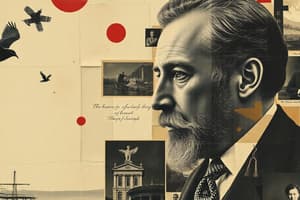Podcast
Questions and Answers
What distinguishes fiction from nonfiction in literature?
What distinguishes fiction from nonfiction in literature?
- Fiction includes novels and short stories, while nonfiction includes essays and biographies. (correct)
- Fiction is based on real events, while nonfiction tells stories.
- Fiction uses poetic forms, while nonfiction uses dramatic expressions.
- Fiction involves staged performances, while nonfiction is solely written.
Which genre of literature is characterized by its narrative depth?
Which genre of literature is characterized by its narrative depth?
- Poetry
- Drama
- Novels (correct)
- Short stories
What are the three main literary productions?
What are the three main literary productions?
- Drama, novels, biographies
- Poetry, essays, drama
- Poetry, drama, novels (correct)
- Fantasy, memoirs, prose
What is the role of literary theory in understanding literature?
What is the role of literary theory in understanding literature?
How does textual studies contribute to literature?
How does textual studies contribute to literature?
What is the first step in giving a critical appreciation of a text?
What is the first step in giving a critical appreciation of a text?
Which aspect is NOT considered part of the definition of literature?
Which aspect is NOT considered part of the definition of literature?
What is one common quality shared by different genres in literature?
What is one common quality shared by different genres in literature?
What underlies the linguistic code in reading?
What underlies the linguistic code in reading?
Which of the following is NOT a type of code identified in reading?
Which of the following is NOT a type of code identified in reading?
What is the primary goal of interpreting a text?
What is the primary goal of interpreting a text?
Criticizing a text requires what level of understanding?
Criticizing a text requires what level of understanding?
Which of the following categories does NOT fall under literature?
Which of the following categories does NOT fall under literature?
The cultural code pertains to which aspect of understanding a text?
The cultural code pertains to which aspect of understanding a text?
How does critiquing a text enhance understanding?
How does critiquing a text enhance understanding?
Which type of writing does nonfiction include?
Which type of writing does nonfiction include?
Flashcards are hidden until you start studying
Study Notes
Literature
- Literature is a diverse field encompassing all written works, particularly those of high quality and lasting value.
- It is divided into two main categories: Fiction and Nonfiction.
Fiction
- Fiction is storytelling that is not based on real events.
- It includes novels, short stories, fairy tales, science fiction, poetry, drama, and fantasy.
Nonfiction
- Nonfiction is writing based on real events.
- It includes biographies, essays, memoirs, and historical accounts.
Main Literary Productions
- Poetry, Drama, and Novels are the three main literary productions.
Literary Genres
- Each genre has unique characteristics and conventions.
- Poetry is known for its musicality.
- Novels are known for their narrative depth.
- Dramas are known for their staged expression.
Literary Theory
- Literary theory helps understand and appreciate literature by providing tools to unlock hidden meanings.
- Textual studies focus on the physical aspects of books, like history, publication details, and different editions.
Textual Studies
- Textual studies explore the creation, sharing, and interpretation of texts.
- It focuses on the entire life cycle of a book, from creation to its impact on readers.
Reading, Interpreting, and Criticizing
- Reading is the foundation of understanding written text.
- It forms a mental storyline or plot, providing a general understanding of the author's message.
- Interpreting a text involves finding deeper meanings beyond summarization.
- It requires active engagement from the reader to seek answers and uncover the text's themes.
- Criticizing a text involves analyzing and connecting it to broader literary concepts and schools of thought.
- It requires a mature understanding of literature to identify themes and codes embedded within the text.
- It elevates understanding beyond surface-level interpretations.
Codes in Text
- Linguistic Code: The language used in the text, understanding it is essential for full comprehension.
- Generic Code: The rules and frameworks specific to each genre (novel, poetry, drama, etc.).
- Cultural Code: Background information relevant to the text, including social, historical, or political contexts.
Studying That Suits You
Use AI to generate personalized quizzes and flashcards to suit your learning preferences.




